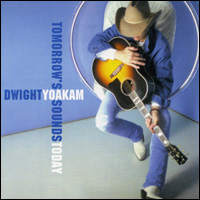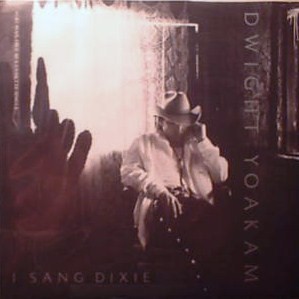
Dwight David Yoakam is an American country singer-songwriter, actor, and filmmaker. He first achieved mainstream attention in 1986 with the release of his debut album Guitars, Cadillacs, Etc., Etc.. Yoakam had considerable success throughout the late 1980s onward, with a total of ten studio albums for Reprise Records. Later projects have been released on Audium, New West, Warner, and Sugar Hill Records.

"Crazy Little Thing Called Love" is a song by the British rock band Queen. Written by Freddie Mercury in 1979, the track is included on their 1980 album The Game, and also appears on the band's compilation album Greatest Hits in 1981. The song peaked at number two in the UK Singles Chart in 1979 and became the group's first number-one single on the Billboard Hot 100 in the US in 1980, remaining there for four consecutive weeks. It topped the Australian ARIA Charts for seven weeks. It was the band's final single release of the 1970s.
"Heartaches by the Number" is a popular country song written by Harlan Howard, and published in 1959. The sheet music was a best seller in both the US and Britain in January 1960.

The song "Ring of Fire" was made popular by Johnny Cash after it appeared on his 1963 compilation album Ring of Fire: The Best of Johnny Cash. Written by Cash's eventual second wife, June Carter Cash, and songwriter Merle Kilgore, "(Love's) Ring of Fire" was originally recorded by June's sister, Anita Carter, on her 1962 album, Folk Songs Old and New.
"I'm So Lonesome I Could Cry" is a song written and recorded by American country music singer-songwriter Hank Williams in 1949. The song has been covered by a wide range of musicians.

If There Was a Way is the fourth studio album by American country music artist Dwight Yoakam, released on October 30, 1990. Five of its tracks would rise into the Top 40 of the Billboard Hot Country Singles chart in 1991 and 1992. They were "Turn It On, Turn It Up, Turn Me Loose" at No. 11, "You're the One" at No. 5, "Nothing's Changed Here" at No. 15, "It Only Hurts When I Cry" at No. 7 "Send a Message to My Heart", at No. 47, and finally the No. 18 "The Heart That You Own".

Buenas Noches from a Lonely Room is the third studio album by American country music singer Dwight Yoakam, released on August 2, 1988. The album contains Yoakam's first two No. 1 Hot Country Singles singles. The first was "Streets of Bakersfield," a duet with country music veteran Buck Owens, who had originally released a version of the song in 1973. The second was an original composition of Yoakam's titled "I Sang Dixie." A third song on the album, "I Got You," also an original composition, peaked at No. 5. The title song, "Buenas Noches from a Lonely Room ," also charted, but only to the No. 46 position.

Guitars, Cadillacs, Etc., Etc. is the debut studio album by American country music artist Dwight Yoakam. This was Yoakam's first time working with long-time collaborator, record producer-guitarist Pete Anderson. The album became the first of three consecutive albums by Yoakam to reach number one on the Billboard Top Country Albums chart.

Hillbilly Deluxe is the second studio album by American country music singer-songwriter, Dwight Yoakam. Released in 1987, it was Yoakam's second consecutive No. 1 album on the Billboard Country Albums chart. Four tracks were released as singles with each becoming Top 10 hits on the Hot Country Singles chart in 1987 and 1988.

This Time is the fifth studio album by American country music artist Dwight Yoakam, released by Reprise Records on March 23, 1993. Three of its tracks barely missed the top spot on the Billboard Hot Country Singles charts, each peaking at #2: "Ain't That Lonely Yet", "A Thousand Miles from Nowhere" and "Fast as You", the latter being his last Top 10 single. Two other tracks also rose into the charts: "Try Not to Look So Pretty" at #14 and "Pocket of a Clown" at #22. The album itself peaked at #4 on the Top Country Albums chart. Yoakam wrote or co-wrote all except for one of the tracks on this album.

Tomorrow's Sounds Today is the eleventh studio album by American country music artist Dwight Yoakam. This album was released on October 31, 2000. It rose to No. 7 on the Billboard Country Albums chart. There were two charting singles among its tracks: "What Do You Know About Love" at No. 26 and "I Want You to Want Me" at No. 49 on the Hot Country Songs chart. Also included are two duets with Buck Owens, who was a big influence on Yoakam's musical style. It was also Yoakam's last studio album for the Reprise label. After that album's release, Yoakam left Reprise for Warner Bros. in 2001.

"I Love This Bar" is a song co-written and recorded by American country music artist Toby Keith. It was released in August 2003 as the first single from his 2003 album Shock'n Y'all. The song reached number one on the US Billboard Hot Country Singles & Tracks chart, keeping the top spot for five weeks. Keith wrote this song with Scotty Emerick.
"Honky-Tonk Man" is a song co-written and recorded by American singer Johnny Horton. It was released in March 1956 as his debut single on Columbia Records, and the album of the same name reaching number 9 on the U.S. country singles charts. Horton re-released the song six years later, taking it to number 11 on the same chart.

Just Lookin' for a Hit is the first compilation album by American country music artist Dwight Yoakam. It includes eight singles from his 1980s albums for Reprise Records, as well as two newly recorded cover songs: "Long White Cadillac," originally recorded by The Blasters, and "Sin City," originally recorded by the Flying Burrito Brothers.

"I Sang Dixie" is a song written and recorded by American country music artist Dwight Yoakam. It was released in October 1988 as the second single from his album Buenas Noches from a Lonely Room. In 1989, the song went to number one on the US Country chart. Rolling Stone ranked "I Sang Dixie" No. 26 on its list of the 40 Saddest Country Songs of All time in 2019.

"You're the One" is a song written and recorded by American country music artist Dwight Yoakam. It was released in February 1991 as the second single from his album If There Was a Way. It peaked at #5 in the United States, and #4 in Canada.
"It Won't Hurt" is a song written and recorded by American country music artist Dwight Yoakam. It was released in November 1986 as the third and final single from his debut album Guitars, Cadillacs, Etc., Etc.. While it missed the top 30 on the Billboard Hot Country Songs chart, it became a top ten hit in Canada, peaking at number 7 on the Canadian RPM country singles chart. The song can be heard during the outro to Yoakam's music video for "Honky-Tonk Man".

Dwight's Used Records is a compilation album by American country music artist Dwight Yoakam. It was released by Audium Records on June 29, 2004. The album peaked at number 57 on the Billboard Top Country Albums chart.
"Guitar Town" is a song written and recorded by American singer-songwriter Steve Earle. It was released in June 1986 as the second single and title track from the album Guitar Town. The song reached number 7 on both the Billboard Hot Country Singles & Tracks chart and the Canadian RPM Country Tracks chart. It was Earle's highest-peaking song to date on the country charts in both the U.S. and Canada. The album version mentions a "Jap guitar", which the radio edit changes to "cheap guitar".

Dwight Yoakam is an American country music singer-songwriter. Since his debut in 1984, Yoakam has released 17 studio albums. His debut album, Guitars, Cadillacs, Etc., Etc., was certified double-platinum by the Recording Industry Association of America, while This Time is certified triple-platinum by the same organization. Yoakam achieved the greatest success of his career in the 1980s and 1990s, however, in the 2000s, he left Reprise Records/Warner Bros. Nashville for an independent record label Audium/Koch Records in 2003 and released Population Me. In 2005, he released Blame the Vain on New West Records. The album was a commercial success on the charts, however, no singles that were released cracked the Top 40 of the Hot Country Songs chart.















